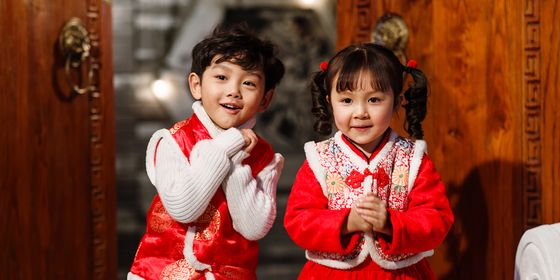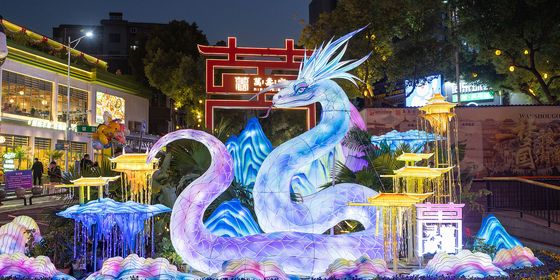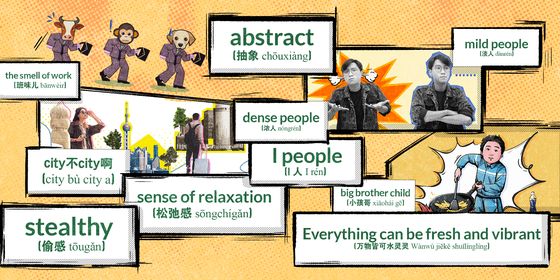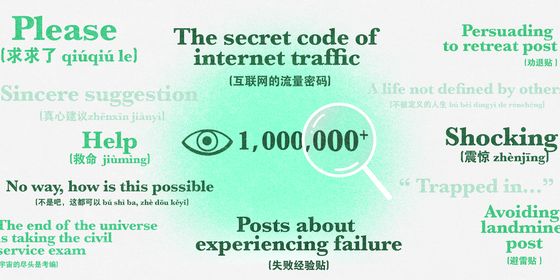Use puns, poems, and memes to welcome in the Year of the Dragon
Of all the 12 Chinese zodiac animals, the dragon is probably the most popular. For millennia, dragons have been symbols of strength and good fortune in China—many people even hope to have children in a dragon year.
To celebrate the Year of Dragon, across the country, towns, shops, and homes are decorated with vibrant dragon-themed artworks, statues, and lanterns, while dragon dance performances are everywhere. But amid the fireworks and festive songs, wishing someone a happy dragon year is more complicated than simply saying 新年快乐 (xīnnián kuàilè, happy new year).
Each new year of the zodiac brings creative ways to offer well-wishes. There are puns, childish memes, or ancient chengyu all themed around dragons (龙 lóng). For example:
Wishing you a fresh start and happiness in the Year of the Dragon. I hope you continue marching forward and your prospects for the year soar like a dragon!
龙年新气象,祝福送万家。愿新的一年里,大家都能如龙般威猛勇往直前,创造辉煌!
New year greetings can also be more specific, while still adhering to the dragon theme. At work, one can wish colleagues well in their creative endeavors:
As the spring breeze brushes against our faces and the dragon soars above, I wish the fountain of creativity flows endlessly for you.
春风拂面龙腾跃,创意源泉涌不断。
However, those less keen on their jobs need not show so much enthusiasm. This year, many young office workers, feeling the stresses of modern life and job hunting in challenging economic conditions, are using many greetings related to work, marriage, and relationships (while still making the effort to include a reference to 龙). One rhyme referencing slang terms for avoiding work:
Stroking fish, lying flat, and relaxing brings a promotion and salary raises as large as a dragon.
摸鱼躺平放轻松,升职加薪一条龙。
Another trend this year has been sparked by state broadcaster CCTV’ annual Spring Festival Gala TV show that runs on Lunar New Year’s Eve each year. Marketing for the show used the uncommon character 龘 (dá). The character, first recorded in the Kangxi Dictionary of 1716, refers to the soaring movement of a dragon. Its use by the national TV broadcaster sparked spirited discussion online and is now being used to convey well-wishes of prosperity and a bright future:
I hope that in this new year, we will stride boldly forward like a dragon and have a promising future.
祝我们在新的一年龙行龘龘,前程朤朤。
Another common theme each year is to employ wordplay and puns related to that year’s zodiac animal. For example:
I wish that your dreams will come true in the next flourishing year.
大展“龙”图,万事兴“龙”,欣欣向“龙”。
Wishing you and your family happiness, love, and warmth every day.
天天合不“龙”嘴,其乐“龙”“龙”,被爱“龙”罩。
Here people use the character 龙 (lóng, dragon) in place of similar sounding ones, such as in “prosperity (兴隆 xīnglóng),” “aspirations (宏图 hóngtú),” “beaming face (合不拢嘴 hébulong zuǐ),” and “flourishing vitality 欣欣向荣 (xīnxīn xiàngróng).”
Those wishing to get sophisticated with their messages of goodwill might incorporate classic poems describing the dragon’s courage, good fortune, and power. Since dragons have been revered (and been the subject of countless purported sightings) for centuries, there are many verses to choose from.
The dragon lurks beneath the deep blue waves, blending with the toad, as it awaits the moment to shine. Its shakes cause thunder, and its swaying rocks, mountains and rivers. May everyone achieve success through their efforts and excel in their respective fields.
蛟龙潜匿隐沧波,且与虾蟆作混和。等待一朝头角就,撼摇霹雳震山河。愿大家都鱼跃龙门,个个都成人中龙凤。
This poem comes from the 12th-century text Emotions Etched in Stone (《书壁述怀》) by Prince Wanyan Liang (完颜亮), and reveals his grand ambitions to become an emperor (a feat he later achieved by murdering his predecessor Xizong of Jin).
Others may be more concerned with practical issues. One tradition in China is gifting red envelopes stuffed with cash to relatives and friends, and with the dragon year being a particularly popular one, some are hoping for a big haul this year:
Aside from saying “Happy New Year,” how about giving a bigger red envelope for the Year of the Dragon?
我们之间除了过年好,就没有大一点儿的龙年红包吗?
Just hope you are the person receiving red envelopes, rather than giving them out.












